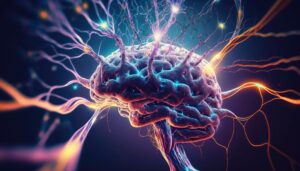Schizophrenia & Psychotic Disorders Treatment
Expert Virtual Mental Health Care Across 8 States
Psychotic disorders like schizophrenia, schizoaffective disorder, and delusional disorders can cause a person to lose touch with reality, making it difficult to know what’s real and what isn’t. These conditions can affect thoughts, perceptions, behaviors, and feelings, and often require highly specialized psychiatric care. At Lifetime Insight, we provide confidential, evidence-based board certified telepsychiatric care to treat schizophrenia and related psychotic disorders. With online virtual care in multiple states, treatment can begin sooner so that patients improve their functioning and maintain stability.
Our board-certified psychiatrists treat adults in California, Florida, Nevada, Virginia, Colorado, Kansas, Iowa, and Nebraska through secure telepsychiatry sessions.
What is Schizophrenia?
Schizophrenia is a serious and chronic mental health condition that affects how a person thinks, feels, and behaves. It often involves hallucinations (seeing or hearing things that aren’t there), delusions (fixed, false beliefs), disorganized thinking, and cognitive impairment. Symptoms usually begin in late adolescence or early adulthood and can vary widely between individuals.
Although schizophrenia is often misunderstood, it is not the same as “split personality.” It is a brain-based disorder that requires comprehensive treatment including medication, therapy, and support to help individuals maintain stability and improve functioning. With early diagnosis and consistent care, many people with schizophrenia can live meaningful, fulfilling lives.

Other Types of Psychotic Disorders
While schizophrenia is the most widely recognized psychotic disorder, there are several other conditions that also involve breaks from reality. These disorders may share overlapping symptoms like delusions, hallucinations, or disorganized thinking but each has distinct features, timelines, and treatment needs. An accurate diagnosis is key to finding the right support and making progress.
Common psychotic disorders include:
Schizoaffective Disorder:
Features symptoms of schizophrenia alongside mood disturbances, such as depression or mania.
Brief Psychotic Disorder:
A sudden, short-term episode of psychotic symptoms, often triggered by extreme stress or trauma – typically resolving within one month.
Delusional Disorder:
Persistent, false beliefs that are not in line with reality – such as being followed, poisoned, or infested with parasites (also called delusional parasitosis) – without other prominent psychotic features.
First-Episode Psychosis:
The first time someone experiences a psychotic episode, often in their teens or 20s – early intervention here is especially important.
Psychotic symptoms due to a medical condition or substance use:
Psychotic symptoms caused by medical illnesses (like seizures or infections) or substances.
First Episode Psychosis: Why Early Intervention Matters
For many individuals, schizophrenia and related conditions begin with what’s called a first episode of psychosis (FEP) – a person’s first experience of hallucinations, delusions, or disorganized thinking. Often, this doesn’t happen out of the blue. A prodromal phase may come first, with subtle changes in mood, sleep, social withdrawal, reduced motivation, or trouble concentrating. These early warning signs are frequently overlooked or mistaken for depression, anxiety, or even normal teenage behavior.
Recognizing psychosis early and getting professional help during the first episode is critical. Early intervention is linked to better long-term outcomes, including fewer relapses, improved functioning, and a better response to treatment. Causes of psychosis can include genetics, trauma, cannabis or substance use, medical illness, or underlying mental health conditions.
If you or someone you love is showing signs of early psychosis, seeking care right away can make a lasting difference.

Common Signs & Symptoms
Psychotic symptoms may develop gradually or come on suddenly, and they can be frightening for both the individual and their loved one. Recognizing the warning signs is key to getting help early. Some of the most common symptoms of psychosis include:
- Hallucinations: hearing, seeing, or feeling things that aren’t there (most often auditory, such as hearing voices)
- Delusions: strong held false beliefs that are not based in reality, such as believing you’re being followed, watched, or have special powers
- Disorganized thinking: following conversations, jumping from topic to topic, or saying things that don’t make sense
- Disorganized or unusual behavior: Unpredictable, impulsive, or inappropriate actions that interfere with daily life
- Paranoia: Intense mistrust of others, sometimes leading to fear or hostility without clear cause.
- Social Withdrawal: Pulling away from family, friends, or normal activities.
- Flattened Affect: Reduced emotional expression, including limited facial expressions or a monotone voice.
- Lack of Motivation: Difficulty starting or completing tasks, even basic self-care.
- Cognitive Difficulties: Problems with focus, memory, or making decisions.
Not everyone will experience all of these symptoms, and in early stages they may be subtle. If you or someone you know is showing signs of psychosis, professional evaluation can help clarify what’s going on and guide next steps.
How We Provide Treatment for Schizophrenia and Other Psychotic Disorders
Our approach to psychotic disorders is rooted in expert psychiatric care, evidence-based treatment management, and coordinated support that helps patients stabilize and thrive. Whether you’re experiencing a first episode of psychosis or managing a chronic condition like schizophrenia or schizoaffective disorder, we’re here to help.
1. Comprehensive Telepsychiatry Evaluation
Your initial appointment is a thorough online assessment. We review your psychiatric and medical history, current symptoms, and any major life changes. We also screen for co-occurring conditions such as depression, bipolar disorder, anxiety, or substance use – all of which can mimic or worsen psychotic symptoms.
2. Integrative Treatment Plans
Effective care for psychotic symptoms starts with a personalized plan — not a one-size-fits-all formula. We focus on managing ongoing symptoms such as delusions or disorganized thinking.
Our team provides ongoing monitoring and adjustments to support stability, minimize side effects, and improve outcomes.
3. Therapy & Support Referrals
While therapy alone isn’t a primary treatment for psychosis, it can be a valuable part of ongoing care and recovery. We can refer to trusted therapists skilled in CBT for Psychosis (CBTp), ACT (Acceptance and Commitment Therapy), supportive counseling, or family focused psychoeducation programs, or social skills or group-based support – all of which can help build insight, reduce stress, and improve functioning.
4. Holistic & Lifestyle Support
Psychosis – especially during a first episode (FEP) or prodromal phase – can be profoundly disruptive, but early lifestyle changes may support recovery and reduce relapse risk. We emphasize:
- Education for patients and families about the condition
- Regular physical activity
- Sleep and daily routine stabilization
- Anti-inflammatory, brain healthy nutrition
- Stress reduction strategies such as mindfulness
- Minimizing alcohol, cannabis, and other psychoactive substances
- Coordination with primary care or neurology if symptoms are linked to other medical issues
Is It Psychosis or Something Else?
Not all psychotic symptoms point to schizophrenia or a primary psychotic disorder. Psychosis can also appear in the context of other medical or psychiatric conditions. At Lifetime Insight, our board-certified psychiatrists take the time to understand what’s really going on – because the right diagnosis matters.
We evaluate whether symptoms may be caused by:
- Severe depression or bipolar disorder with psychotic features – where hallucinations or delusions occur during mood episodes
- Substance use or withdrawal – including cannabis, stimulants, hallucinogens, alcohol, or even certain prescription medications
- Neurological conditions – such as dementia, Parkinson’s disease, traumatic brain injury, or seizures
- Medical issues – like infections, autoimmune disorders, metabolic or endocrine conditions
A comprehensive evaluation helps us determine whether the symptoms represent a primary psychotic illness, a first episode of psychosis, or another underlying cause. This is crucial for developing the right treatment plan and avoiding unnecessary treatments.


When to Seek Help
You should seek online psychotic disorder treatment if you or someone you care about:
- Experiences hallucinations or delusions
- Shows sudden, severe changes in behavior or thinking
- Withdraws from friends, family, or work
- Struggles to maintain daily responsibilities due to symptoms
- Has been recently discharged from inpatient psychiatric care and needs follow-up
Early intervention improves outcomes and can help prevent relapse.
Insurance, Self-Pay & States We Serve
We offer HIPAA-compliant virtual visits for adults in California, Florida, Nevada, Nebraska, Virginia, Colorado, Kansas, and Iowa.
- Most major insurance accepted: Blue Cross, Blue Shield, Cigna, Aetna, Anthem
- Proud Lyra Health partner, offering no-cost care through select employer-sponsored plans
- Self-pay rates: $495 for initial evaluations, $235 for follow-up visits
*Please note: We do not accept Medicare, Medicaid, Tricare, or UMR/Optum. UMR/Optum
Why Choose Lifetime Insight?
Care from board-certified psychiatrists experienced in treating psychotic disorders
No app downloads: secure access from any device
Appointments typically available within a week
Collaborative, long-term treatment approach
Direct communication with your provider between visits
Take the First Step Toward Stability
Psychotic disorders can feel overwhelming, but with the right treatment, many people manage their symptoms and live meaningful lives. Our psychiatrists provide online psychotic disorder treatment that’s respectful, individualized, and designed to support your recovery.
Schedule your first appointment today and take the next step toward stability and hope.
Latest Insights on Mental Health & Recovery

Low Dopamine: The Hidden Symptoms—and How to Feel Better
What Does Low Dopamine Really Feel Like? By Sarit Hovav, MD, FAPAPublished October 24, 2025 Facebook X-twitter Linkedin Envelope Low dopamine doesn’t always feel like

Inflammation and Depression: The Hidden Causes—and How to Feel Better
Beyond Brain Chemistry: The Body’s Role in Depression Feeling persistently low, foggy, or fatigued — even when life looks “fine” on paper — might not

CTE (Chronic Traumatic Encephalopathy): The Hidden Symptoms—And How to Heal
Caring for your brain health doesn’t end when the game does.If you’re a former athlete—or someone who loves one—and you’ve noticed mood swings, memory loss,
